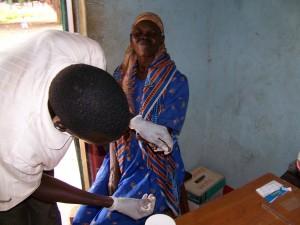Overtreatment of malaria in Africa raises concerns
A patient at a drug shop in eastern Uganda braces for a finger prick. The rapid diagnostic test will determine if she has malaria. (Photo: Jill Braden Balderas)
Story by Jill Braden Balderas, PRI’s The World. Listen to audio for full report.
Prescribing malaria medication to patients who don’t need it wastes precious resources in countries like Uganda, which are already dealing with drug shortages. It leaves patients untreated for the real cause of their sickness. And it can lead to drug resistance, making malaria parasites harder to eliminate when people really do contract the disease.
So why do health workers ignore negative test results?
“Part of the problem is the training we get at our medical schools,” says Bosco Agaba, who heads up malaria diagnostic services at Uganda’s Ministry of Health.
“We were taught that in Uganda, malaria is everywhere, it is endemic,” he says. “And so, if you see a patient with fever, the first thing is malaria, that patient has malaria.”
At one time, that thinking was encouraged. In fact, the World Health Organization used to urge African doctors to assume that a feverish child had malaria and to treat the patient right away. The disease can kill children quickly if treatment is delayed, and tests to confirm the diagnosis were scarce.
But across Africa, diagnostic tests are becoming more available, and that has prompted the WHO to change its policy. It now says malaria should be confirmed before treatment is given.
Read the rest of this story on The World website.
———————————————————–
PRI’s “The World” is a one-hour, weekday radio news magazine offering a mix of news, features, interviews, and music from around the globe. “The World” is a co-production of the BBC World Service, PRI and WGBH Boston. More about The World.
Our coverage reaches millions each week, but only a small fraction of listeners contribute to sustain our program. We still need 224 more people to donate $100 or $10/monthly to unlock our $67,000 match. Will you help us get there today?
